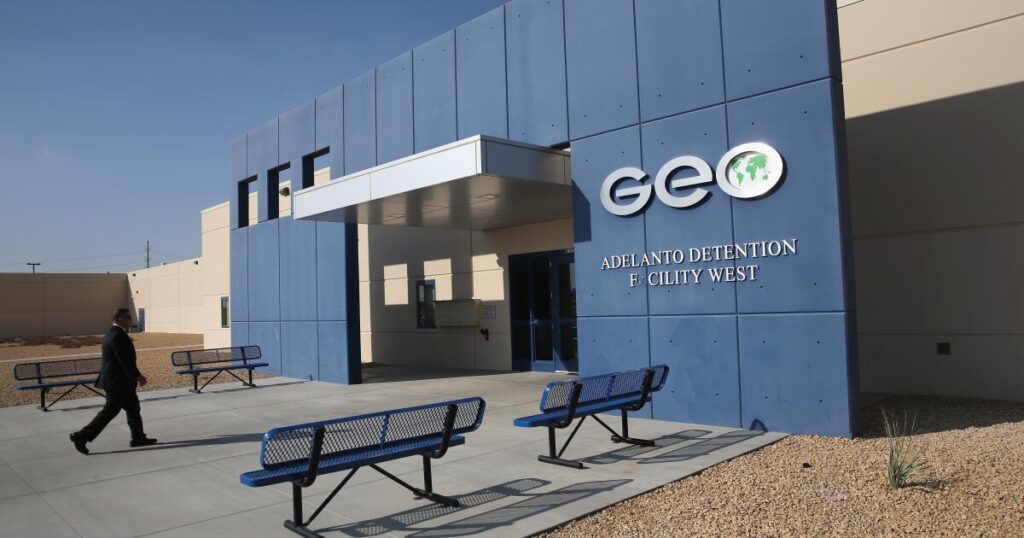Private prison company GEO Group has been accused by the National Labor Relations Board of retaliating against immigrant detainees who protested working conditions inside a California facility.
GEO Group punished detainees housed at its detention center in Bakersfield who signed a petition and participated in a work stoppage to protest wages and other working conditions, federal labor regulators alleged in a Jan. 6 complaint by a regional NLRB office in Los Angeles. Protesters had commissary privileges revoked, were placed in solitary confinement and faced disciplinary write-ups, the complaint alleges.
Some of the detainees also launched a hunger strike in February 2023, and in response the company “forcibly removed” workers and transferred them to a detention center in El Paso, according to the complaint.
The two detainees named in the complaint, Pedro Jesus Figueroa Padilla and Jose Ruben Hernandez Gomez, held cleaning and maintenance jobs at GEO Group’s Bakersfield facility, where the company houses people detained by the U.S. Immigration and Customs Enforcement. The men were paid $1 per day for the work, their attorney said.
The California Collaborative for Immigrant Justice, an organization that represents the detainees and has previously sued the GEO Group over wages, called the NLRB’s complaint “a landmark move for workers’ rights,” because it recognized detained workers as employees under federal law.
GEO Group spokesperson Christopher Ferreira said in an email that the company “strongly disagrees with and disputes the allegations.”
Ferreira said that, because work was performed on a “strictly voluntary” basis, the immigrant detainees could not be considered employees under federal law and were not subject to alleged violations.
“Participation in the Voluntary Work Program by persons detained and housed at the Center by the federal government does not make such persons ‘employees,’” Ferreira said. “We believe that the decision by a non-employee to discontinue his or her participation in a voluntary work program cannot and does not constitute a ‘labor strike.’”
The complaint is a first step by the NLRB in litigating the case and comes after an investigation found merit to claims made by the detainees. If a settlement with GEO Group is not reached, the case will be reviewed by an administrative law judge at a hearing scheduled for August. The judge’s decision on what, if anything, GEO Group must do to address the issues raised in the complaint could then be appealed.
Sameer Ashar, an attorney at UC Irvine’s Workers, Law, and Organizing Clinic who represents the detainees, said that the case likely faces an uphill battle with the labor board now under the control of President Trump’s administration. Trump has been critical of what he views as the board’s pro-worker leanings.
“I’m not sure whether the agency under the new Trump administration will allow this complaint to go forward, and GEO will certainly be doing whatever it can to kill it,” Ashar said.
Gomez, one of the workers involved in the complaint, and his attorney said that when the GEO Group transferred Gomez and several other detainees to a facility in El Paso, armed ICE officers shackled their hands and feet, put them in solitary confinement for several hours and threatened to force-feed them to break the hunger strike. He was released from custody soon after the transfer, in April 2023, in a wheelchair because of injuries he suffered from several falls due to the effects of the hunger strike and unsanitary conditions in the detention facility.
“I have to deal with nightmares and flashbacks,” Gomez said. “I think about those that are still in detention.”
GEO Group did not respond to questions about force-feeding and Gomez’s description of his treatment in the facility.
The Florida-based GEO Group operates three facilities in California — Mesa Verde, Adelanto and Golden State Annex — that have been hotbeds of activism among detainees for years. The company, meanwhile, has waged battle with California officials to keep regulators out of its facilities.
When COVID-19 outbreaks hit ICE detention centers, there was confusion among state and local health officials over who was responsible for vaccinating detainees. In 2021, Gov. Gavin Newsom signed a law clarifying the facilities had to abide by local and state health orders. The law included a provision that made them subject to state workplace safety rules.
However, in 2022, when California workplace health and safety regulators opened an investigation into the Golden State Annex facility, they accused the GEO Group of resisting inspections, according to Cal Matters. California eventually levied $104,510 in fines after immigrant detainees complained about unsafe conditions, including a lack of protective equipment and proper training, while cleaning the facility for $1 per day.
In August, Newsom signed a law allowing local public health officials to inspect immigration detention facilities. In October, GEO Group filed a federal lawsuit in an effort to block the law.
